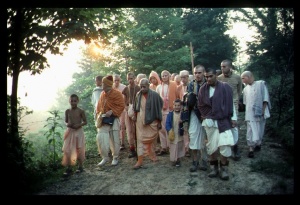SB 9.8.13: Difference between revisions
m (1 revision(s)) |
No edit summary |
||
| Line 1: | Line 1: | ||
{{info | {{info | ||
|speaker= | |speaker=Śukadeva Gosvāmī | ||
|listener=King | |listener=King Parīkṣit | ||
}} | }} | ||
[[Category:Srimad-Bhagavatam - Canto 09 Chapter 08]] | |||
[[Category:Bhagavatam Verses Spoken by Sukadeva Gosvami - Vanisource|090813]] | |||
<div style="float:left">'''[[Srimad-Bhagavatam]] - [[SB 9|Ninth Canto]] - [[SB 9.8: The Sons of Sagara Meet Lord Kapiladeva|Chapter 8: The Sons of Sagara Meet Lord Kapiladeva]]'''</div> | |||
<div style="float:right">[[File:Go-previous.png|link=SB 9.8.12]] '''[[SB 9.8.12]] - [[SB 9.8.14]]''' [[File:Go-next.png|link=SB 9.8.14]]</div> | |||
{{RandomImage}} | |||
==== TEXT 13 ==== | ==== TEXT 13 ==== | ||
<div | <div class="verse"> | ||
yasyeritā sāṅkhyamayī dṛḍheha naur | :yasyeritā sāṅkhyamayī dṛḍheha naur | ||
yayā mumukṣus tarate duratyayam | :yayā mumukṣus tarate duratyayam | ||
bhavārṇavaṁ mṛtyu-pathaṁ vipaścitaḥ | :bhavārṇavaṁ mṛtyu-pathaṁ vipaścitaḥ | ||
parātma-bhūtasya kathaṁ pṛthaṅ-matiḥ | :parātma-bhūtasya kathaṁ pṛthaṅ-matiḥ | ||
</div> | </div> | ||
| Line 17: | Line 22: | ||
==== SYNONYMS ==== | ==== SYNONYMS ==== | ||
<div | <div class="synonyms"> | ||
''yasya''—by whom; ''īritā''—had been explained; ''sāṅkhya-mayī''—having the form of the philosophy analyzing the material world (Sāṅkhya philosophy); ''dṛḍhā''—very strong (to deliver people from this material world); ''iha''—in this material world; ''nauḥ''—a boat; ''yayā''—by which; ''mumukṣuḥ''—a person desiring to be liberated; ''tarate''—can cross over; ''duratyayam''—very difficult to cross; ''bhava-arṇavam''—the ocean of nescience; ''mṛtyu-patham''—a material life of repeated birth and death; ''vipaścitaḥ''—of a learned person; ''parātma-bhūtasya''—who has been elevated to the transcendental platform; ''katham''—how; ''pṛthak-matiḥ''—a sense of distinction (between enemy and friend). | |||
</div> | </div> | ||
| Line 24: | Line 29: | ||
==== TRANSLATION ==== | ==== TRANSLATION ==== | ||
<div | <div class="translation"> | ||
Kapila Muni enunciated in this material world the Sāṅkhya philosophy, which is a strong boat with which to cross over the ocean of nescience. Indeed, a person eager to cross the ocean of the material world may take shelter of this philosophy. In such a greatly learned person, situated on the elevated platform of transcendence, how can there be any distinction between enemy and friend? | Kapila Muni enunciated in this material world the Sāṅkhya philosophy, which is a strong boat with which to cross over the ocean of nescience. Indeed, a person eager to cross the ocean of the material world may take shelter of this philosophy. In such a greatly learned person, situated on the elevated platform of transcendence, how can there be any distinction between enemy and friend? | ||
</div> | </div> | ||
| Line 31: | Line 36: | ||
==== PURPORT ==== | ==== PURPORT ==== | ||
<div | <div class="purport"> | ||
One who is promoted to the transcendental position (brahma-bhūta ([[SB 4.30.20]])) is always jubilant (prasannātmā). He is unaffected by the false distinctions between good and bad in the material world. Therefore, such an exalted person is samaḥ sarveṣu bhūteṣu; that is to say, he is equal toward everyone, not distinguishing between friend and enemy. Because he is on the absolute platform, free from material contamination, he is called parātma-bhūta or brahma-bhūta. Kapila Muni, therefore, was not at all angry at the sons of Sagara Mahārāja; rather, they were burnt to ashes by the heat of their own bodies. | One who is promoted to the transcendental position (''brahma-bhūta'' ([[SB 4.30.20]])) is always jubilant (''prasannātmā''). He is unaffected by the false distinctions between good and bad in the material world. Therefore, such an exalted person is ''samaḥ sarveṣu bhūteṣu;'' that is to say, he is equal toward everyone, not distinguishing between friend and enemy. Because he is on the absolute platform, free from material contamination, he is called ''parātma-bhūta'' or ''brahma-bhūta''. Kapila Muni, therefore, was not at all angry at the sons of Sagara Mahārāja; rather, they were burnt to ashes by the heat of their own bodies. | ||
</div> | </div> | ||
__NOTOC__ | |||
<div style="float:right; clear:both;">[[File:Go-previous.png|link=SB 9.8.12]] '''[[SB 9.8.12]] - [[SB 9.8.14]]''' [[File:Go-next.png|link=SB 9.8.14]]</div> | |||
__NOTOC__ | |||
__NOEDITSECTION__ | |||
Revision as of 16:15, 15 May 2021

A.C. Bhaktivedanta Swami Prabhupada
TEXT 13
- yasyeritā sāṅkhyamayī dṛḍheha naur
- yayā mumukṣus tarate duratyayam
- bhavārṇavaṁ mṛtyu-pathaṁ vipaścitaḥ
- parātma-bhūtasya kathaṁ pṛthaṅ-matiḥ
SYNONYMS
yasya—by whom; īritā—had been explained; sāṅkhya-mayī—having the form of the philosophy analyzing the material world (Sāṅkhya philosophy); dṛḍhā—very strong (to deliver people from this material world); iha—in this material world; nauḥ—a boat; yayā—by which; mumukṣuḥ—a person desiring to be liberated; tarate—can cross over; duratyayam—very difficult to cross; bhava-arṇavam—the ocean of nescience; mṛtyu-patham—a material life of repeated birth and death; vipaścitaḥ—of a learned person; parātma-bhūtasya—who has been elevated to the transcendental platform; katham—how; pṛthak-matiḥ—a sense of distinction (between enemy and friend).
TRANSLATION
Kapila Muni enunciated in this material world the Sāṅkhya philosophy, which is a strong boat with which to cross over the ocean of nescience. Indeed, a person eager to cross the ocean of the material world may take shelter of this philosophy. In such a greatly learned person, situated on the elevated platform of transcendence, how can there be any distinction between enemy and friend?
PURPORT
One who is promoted to the transcendental position (brahma-bhūta (SB 4.30.20)) is always jubilant (prasannātmā). He is unaffected by the false distinctions between good and bad in the material world. Therefore, such an exalted person is samaḥ sarveṣu bhūteṣu; that is to say, he is equal toward everyone, not distinguishing between friend and enemy. Because he is on the absolute platform, free from material contamination, he is called parātma-bhūta or brahma-bhūta. Kapila Muni, therefore, was not at all angry at the sons of Sagara Mahārāja; rather, they were burnt to ashes by the heat of their own bodies.